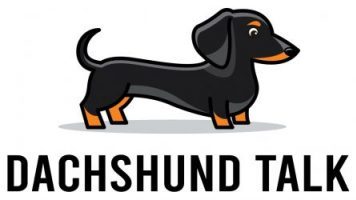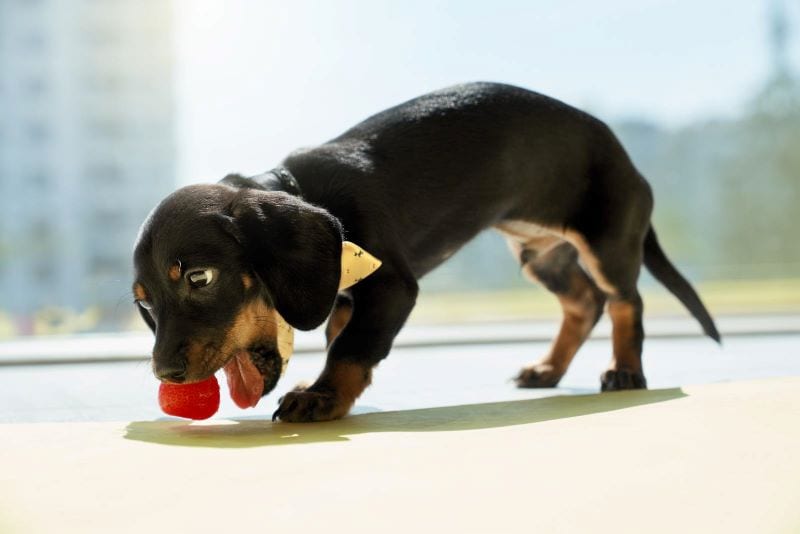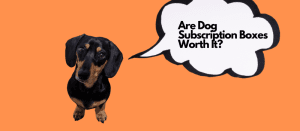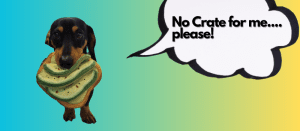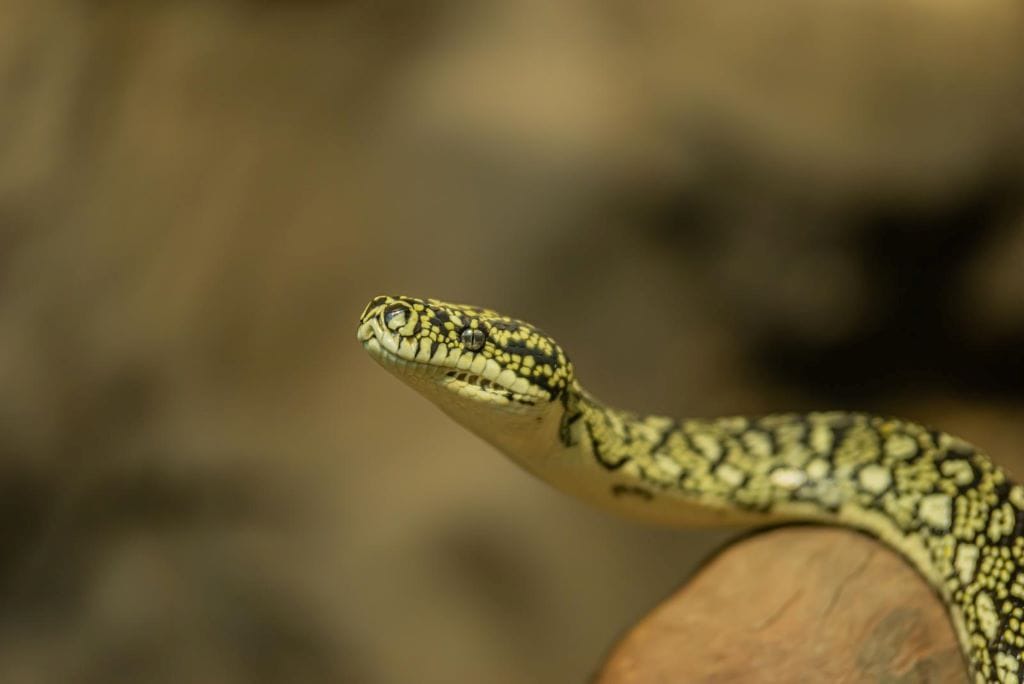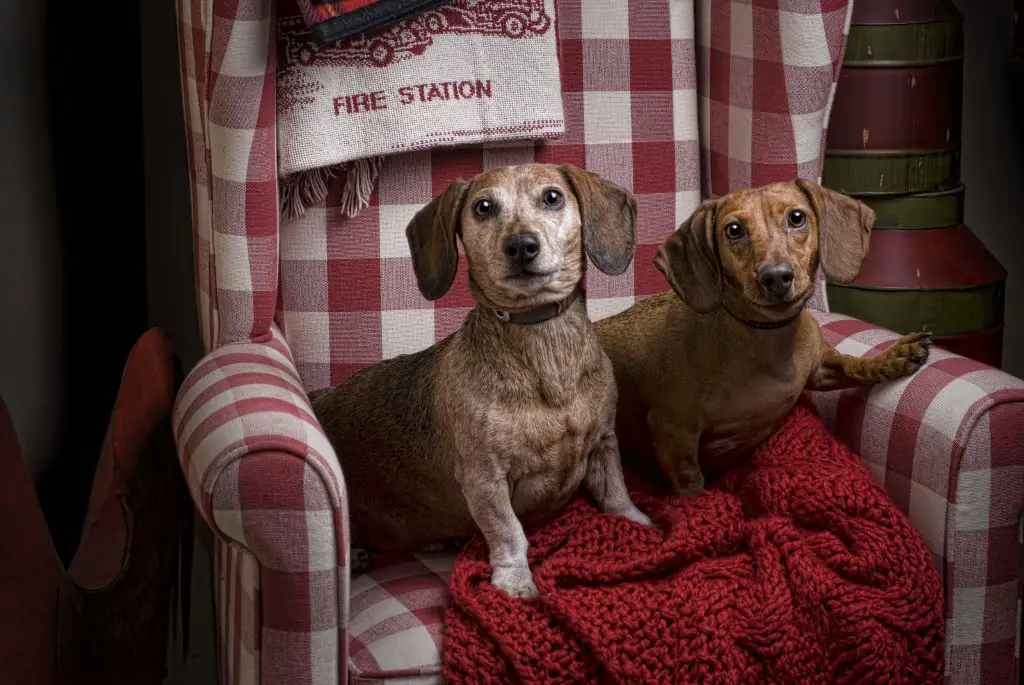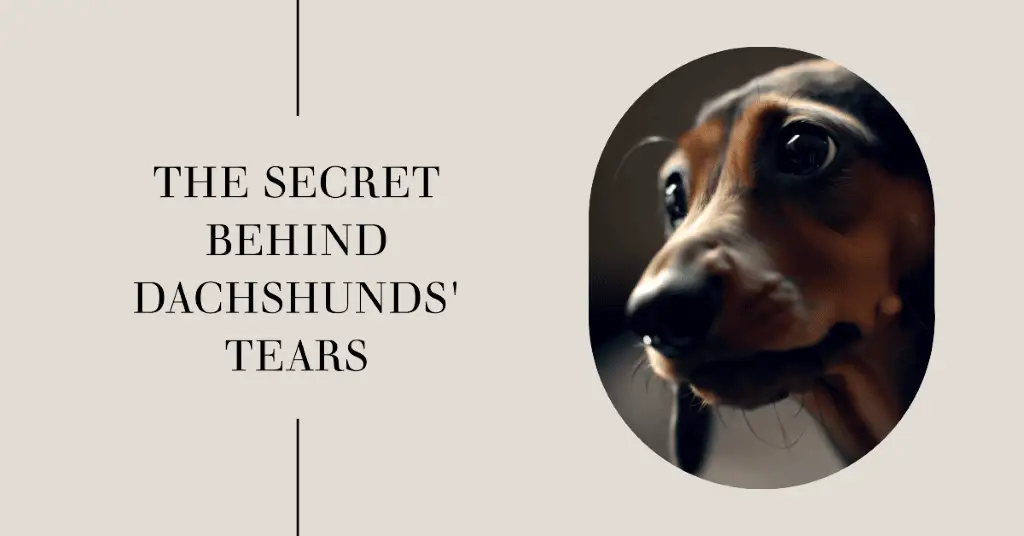Miniature dachshunds are an adorable breed of dog that require proper nutrition to maintain their health and well-being. Feeding them the right amount and type of food can be a bit tricky, especially for new dog owners. A feeding chart can be a helpful tool in ensuring that your miniature dachshund is getting the right amount of food and nutrients.
Feeding charts provide a guideline for how much food your dog should be eating based on factors such as their age, weight, and activity level. They can also help prevent overfeeding, which is a common issue with miniature dachshunds. Overfeeding can lead to obesity, which can cause health problems such as joint pain and heart disease.
It’s important to note that feeding charts are not a one-size-fits-all solution. Every dog is unique and may require different amounts of food based on their individual needs. It’s also important to choose high-quality, nutritious food that is appropriate for your dog’s age and size. Consulting with a veterinarian can also be helpful in determining the best feeding plan for your miniature dachshund.
Understanding Miniature Dachshund Nutritional Needs
Feeding your miniature dachshund the right amount of food with the right nutrients is essential for their overall health and wellbeing. Here are some factors that affect their nutritional needs:
Age
As with any dog, a miniature dachshund’s nutritional needs change as they age. Puppies require more calories and nutrients to support their growth and development, while adult and senior dachshunds require fewer calories and different nutrients to maintain their health.
Size and Weight
Miniature dachshunds are small dogs, so they require less food than larger breeds. However, their individual size and weight can still affect their nutritional needs. A dachshund that is overweight may require fewer calories to maintain a healthy weight, while a dachshund that is very active may require more calories.
Activity Level
The amount of exercise your miniature dachshund gets can also affect their nutritional needs. Dogs that are more active require more calories to fuel their energy needs, while dogs that are less active require fewer calories.
Health Conditions
Some health conditions can affect a miniature dachshund’s nutritional needs. For example, a dachshund with diabetes may require a special diet that is low in carbohydrates, while a dachshund with kidney disease may require a diet that is low in protein.
Dietary Restrictions
If your miniature dachshund has any dietary restrictions or allergies, it is important to choose a food that meets their specific needs. This may require working with your veterinarian to find the right food for your dog.
Understanding these factors can help you choose the right food and feeding schedule for your miniature dachshund. Consult with your veterinarian to create a personalized feeding plan that meets your dog’s individual nutritional needs.
Creating a Miniature Dachshund Feeding Chart
Feeding a miniature dachshund involves more than just giving them food. Owners need to create a feeding chart that takes into account their dog’s daily caloric intake, the right proportion of nutrients, and the type of food that is best for their dog.
| Age | Weight Range | Amount of Food | Number of Meals | Amount per Meal |
|---|---|---|---|---|
| 8 weeks | 2 – 3 pounds | 1/4 – 1/3 cup per day (4 feedings) | 4 | 1 – 2 tablespoons |
| 3 months | 4 – 5 pounds | 1/3 – 1/2 cup per day (3 – 4 feedings) | 3 – 4 | 2 – 3 tablespoons |
| 4 months | 6 – 7 pounds | 1/2 – 2/3 cup per day (3 feedings) | 3 | 3 – 4 tablespoons |
| 5 months | 7 – 8 pounds | 2/3 – 3/4 cup per day (3 feedings) | 3 | 3 – 4 tablespoons |
| 6 months | 8 – 9 pounds | 3/4 – 1 cup per day (2 – 3 feedings) | 2 – 3 | 3 – 4 tablespoons |
| 7 months | 9 – 10 pounds | 3/4 – 1 cup per day (2 – 3 feedings) | 2 – 3 | 3 – 4 tablespoons |
| 8 months | 10 – 11 pounds | 3/4 – 1 cup per day (2 – 3 feedings) | 2 – 3 | 3 – 4 tablespoons |
| 9 – 12 months | 11 – 12 pounds | 3/4 – 1 cup per day (2 – 3 feedings) | 2 – 3 | 3 – 4 tablespoons |
| Over 1 year | 11 – 13 pounds | 1/2 – 1 1/2 cups per day (2 feedings) | 2 | 1/4 – 1/2 cup |
It’s important to note that this feeding chart is only a general guide, and the exact amount of food your miniature dachshund needs may vary based on factors such as age, weight, activity level, and overall health. It’s always best to consult with a veterinarian to determine the appropriate feeding plan for your dog.
Calculating Daily Caloric Intake
The first step in creating a feeding chart for a miniature dachshund is to calculate their daily caloric intake. This can be done by using an online calculator or by consulting with a veterinarian. The daily caloric intake will depend on factors such as the dog’s age, weight, activity level, and overall health.
Proper feeding is essential for your adult miniature dachshund’s overall health, with dry food being the recommended choice. A daily intake of 250 grams or 8-9 ounces, spread across two meals, is generally considered sufficient.
However, if you prefer to feed your dog wet food, it’s important to adjust the quantity based on factors such as the type of food and your dog’s exact weight. As a general guideline, adult dachshunds typically need around 10 to 12 ounces (or 280 to 340 grams) of wet food per day.
Determining the Right Proportion of Nutrients
Once the daily caloric intake has been determined, the next step is to ensure that the dog is getting the right proportion of nutrients. A balanced diet for a miniature dachshund should include protein, carbohydrates, fats, vitamins, and minerals.
The exact proportion of nutrients will depend on the dog’s age, weight, activity level, and overall health. As a general rule, a good quality dog food should have at least 18% protein and 5% fat. Owners can also supplement their dog’s diet with fresh fruits and vegetables, but they should consult with a veterinarian first to ensure that they are giving their dog the right nutrients in the right proportion.
Choosing the Right Type of Food
Choosing the right type of food is also important when creating a feeding chart for a miniature dachshund. Owners should look for high-quality dog food that is specifically formulated for small breeds. The food should be free from fillers, artificial preservatives, and other harmful ingredients.
Owners can choose between dry and wet food, or a combination of both. Wet food is a good option for dogs that have trouble chewing or swallowing dry food, but it can be more expensive and spoil more quickly. Dry food is more convenient and less expensive, but it can be harder for some dogs to digest.
- FORMULATED FOR PUREBRED DACHSHUNDS: Royal Canin Dachshund Adult Dry Dog Food is designed to meet the nutritional needs of purebred Dachshunds 10 months and older
- SPECIALIZED KIBBLE: Unique kibble shape helps Dachshunds pick up and chew their food
- BONE AND JOINT: Calcium and phosphorus provide joint and bone support to help aid a small dog’s tiny limbs and a long backbone
- MUSCLE SUPPORT: Supports a little dog’s muscle tone with precise protein content and L-carnitine
- OPTIMAL STOOL: Highly digestible proteins and precise fiber content reduce stool volume and stool odor
Feeding Schedule for Miniature Dachshunds

Feeding a miniature dachshund requires a balanced diet and a consistent feeding schedule. In this section, we will discuss the frequency of feeding and portion control for miniature dachshunds.
Frequency of Feeding
Miniature dachshunds should be fed twice a day, with a gap of 8-12 hours between meals. This ensures that the dog’s digestive system has enough time to process the food. Puppies under six months of age may require three meals a day to meet their nutritional requirements.
It is important to establish a feeding routine and stick to it. This helps the dog develop a healthy appetite and reduces the risk of overeating or undereating.
Portion Control
Portion control is crucial to maintaining a healthy weight for miniature dachshunds. Overfeeding can lead to obesity, which can cause joint problems and other health issues. Underfeeding can result in malnutrition and stunted growth.
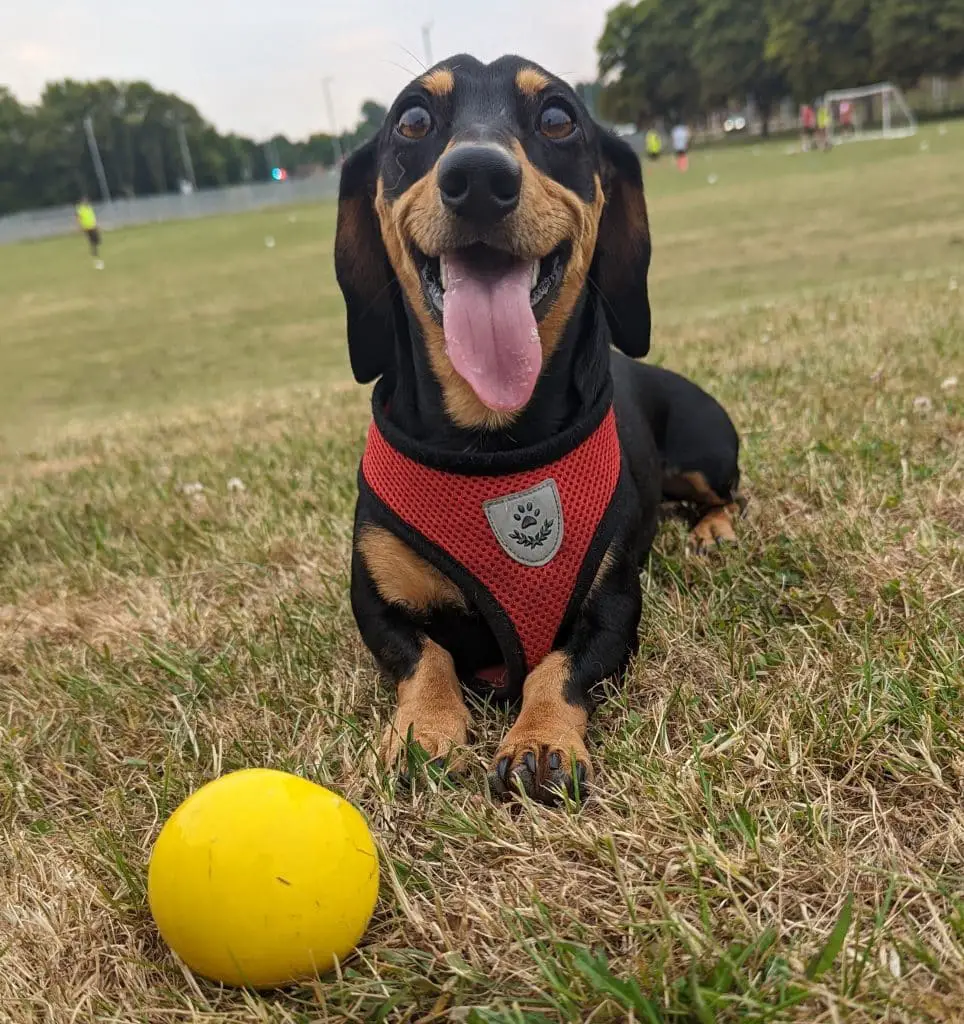
Save Your Dachshund From Joint Problems!
The amount of food a miniature dachshund needs depends on its age, weight, and activity level. Feeding your adult miniature dachshund dry food is typically recommended, with a general guideline of 250 grams or 8-9 ounces per day, divided into two meals.
When it comes to feeding your miniature dachshund wet food, it’s important to consider factors such as the type of food and your dog’s weight. Generally, wet food portions should be slightly higher than dry food portions, with daily amounts ranging from 10 to 12 ounces (or 280 to 340 grams) for a typical adult dachshund.
It is important to measure the food accurately and adjust the portion size based on the dog’s weight and activity level. Table scraps and human food should be avoided as they can upset the dog’s stomach and lead to obesity.
Additional Tips for Feeding Miniature Dachshunds

Avoiding Foods that are Harmful to Miniature Dachshunds
While it’s important to provide your miniature dachshund with a balanced diet, there are certain foods that can be harmful to them. Some of the foods to avoid include:
- Chocolate
- Caffeine
- Onions and garlic
- Avocado
- Grapes and raisins
- Macadamia nuts
- Bones (cooked or uncooked)
If your miniature dachshund accidentally ingests any of these foods, it’s important to contact your veterinarian immediately.
Supplementing Your Miniature Dachshund’s Diet
While miniature dachshunds require a small amount of food, it’s important to ensure they are getting all the necessary nutrients. Supplementing their diet with healthy snacks can be a great way to provide additional nutrients. Some healthy snack options include:
- Carrots
- Green beans
- Blueberries
- Apples (without seeds)
- Plain, unsweetened yogurt
- Cooked, skinless chicken or turkey
It’s important to remember that snacks should not make up more than 10% of your miniature dachshund’s diet.
Hydration
Miniature dachshunds, like all dogs, require access to fresh water at all times. It’s important to monitor their water intake, especially during warmer months or if they are more active than usual. Signs of dehydration in dogs include:
- Lethargy
- Dry, sticky gums
- Panting
- Loss of skin elasticity
- Dark urine
If you suspect your miniature dachshund is dehydrated, it’s important to contact your veterinarian immediately.
Conclusion
Feeding a miniature dachshund is not rocket science, but it requires some attention and care. As a small breed, they have a high metabolism and need a balanced diet to maintain their health and energy levels.
Based on the research, a standard feeding schedule for a miniature dachshund is two meals per day. The amount of food depends on the age, weight, and activity level of the dog. It is recommended to feed them a mix of dry and wet food to ensure they get all the necessary nutrients.
It is also important to note that overfeeding can lead to obesity, which can cause health problems for your furry friend. It is best to stick to the recommended feeding guidelines and consult with a veterinarian if you have any concerns about your dog’s diet.
Lastly, always make sure your miniature dachshund has access to fresh water and monitor their eating habits to ensure they are not experiencing any digestive issues. With the right diet and care, your miniature dachshund can live a happy and healthy life.
